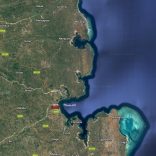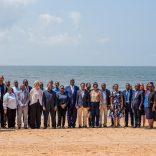Mozambique: Administrative Tribunal audit criticises Housing Development Fund
Angola and Mozambique pose a high risk for investors

Image: Macauhub
Angola and Mozambique are among the highest-risk African countries, albeit with an upward trend in returns for investors, according to the Risk-Reward Index 2019, a study by consulting firms Oxford Economics and Control Risks.
In the study, Angola’s risk score is 6.16, an improvement of 0.13 points, but almost double that of highest ranked Mauritius /3.45) and Botswana (3.47), while Mozambique scores 6.07, also an improvement over the 2018 edition (by 0.11 points).
Mozambique also scores better than Angola on reward – 3.72 compared to 3.18 – although developments are less favourable than Angola’s (0.24 vs. 0.69).
Africa Risk-Reward Index 2019 reveals the Trends Shaping a New Investment Landscape – read the full document.https://t.co/n8Q8He8wTr#Mozambique #Africa #Investment #Business pic.twitter.com/moJzSpOGA4
— Club of Mozambique (@clubOmozambique) September 26, 2019
In terms of improvement of reward score, Angola’s is only surpassed by that of Zimbabwe.
Angola is one of the highlights of the study, being ” one of the best performers in this edition of the Africa Risk-Reward Index, judged in terms of improvement in risk-reward score since the third edition”. Its improvement is attributed to the “ambitious reform agenda pursued by President João Lourenço,” since coming to power two years ago, although the country’s situation is assessed with some reservations. “Despite these improvements, Angola’s risk score remains significantly higher and its reward score significantly lower than continental averages”.
“A host of fiscal, monetary and regulatory reforms have been accompanied by more significant structural changes that have challenged vested interests and introduced a degree of oversight to economic governance.,” the study said.
This process has mainly involved interests linked to the former president, José Eduardo dos Santos, his family and political allies.
“Two years of reform efforts have had an impact, but they have also highlighted the intractable nature of many of Angola’s challenges. Foreign-exchange shortages persist, the economy remains over-reliant on oil, and we forecast that 2019 will be the fourth consecutive year of recession.,” the analysts said.
As in Ethiopia, they noted, “the grand plans and popularity of reformist leaders have lost momentum as they come up against complex party structures”.
Traditional party powerbrokers are unlikely to relinquish influence and tend not to favour changing the systems that have ensured their political and economic dominance, according to Oxford Economics and Control Risks. Meanwhile, in bith Angola and Ethiopia, “sectors will open up at varying rates and in different ways, depending on vested interests and political considerations,” reads the report.
- The 2019 Africa Risk-Reward Index PDF is HERE












Leave a Reply
Be the First to Comment!
You must be logged in to post a comment.
You must be logged in to post a comment.